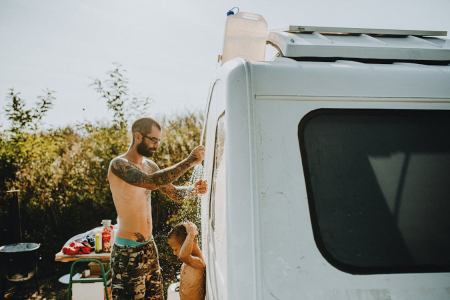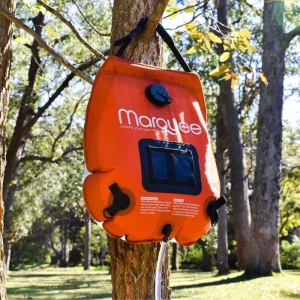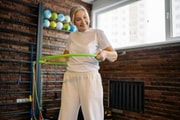How often do Aussies really shower at camp? The debate you didn't know you were missing
By
Maan
- Replies 0
Campsites offer the perfect escape into nature, but the experience isn’t always as idyllic as it seems, especially when it comes to one basic necessity: hygiene.
A growing debate among Aussie campers reveals varying opinions on how often one should shower while enjoying the great outdoors.
While some swear by regular scrubbing, others take a more relaxed approach.
Showering is often an everyday routine, but it becomes a whole different issue when you’re out camping, far from the comfort of home.
Camping trips are all about sand, sea, and sunshine, but the reality of staying outdoors can make hygiene a bit tricky.
Campsite showers, if they exist, are sometimes less than inviting, with spider webs and bugs hanging around—or worse, no shower at all if you're off-grid.

The frequency of showers on a camping trip has sparked some debate in the camping community.
While many people in the group claimed every few days was sufficient, experts have different opinions.
The consensus on showering habits at campsites is anything but uniform.
Some campers prefer to shower as often as possible, while others feel less frequent showers work just fine for them.
'I try and get to a campsite every few days to wash my stuff and shower,' said one camper in a popular social media group.
'I would often jump into a lake/river/ocean if possible. My body odour rarely goes too far, and would put on more deodorant when entering congested circumstances (restaurant/enclosed eatery/etc),' said another.
Others feel a little less concerned about cleanliness in nature.
'Mind over matter. If you don’t mind it doesn’t matter,' wrote one camper.
'I just don’t wash,' said another.
For parents, this divide continued.
'I’m in between every night and whenever they need. Some nights it’s just impossible to get them into bed at a reasonable time if they have a shower/bath—in an ideal world I would say every night but I would be lying,' one camper commented.
Meanwhile, another camper argued: 'Every night, my kids get absolutely filthy when camping.'
However, skipping showers altogether isn’t something dermatologists recommend—even on a short camping trip.
Dr Shammi Theesan, a dermatologist at ODE Dermatology Clinic in Melbourne, suggested showering every other day and washing hair three times a week.
'Always use shampoo rather than just rinsing with water, as this helps prevent yeast or Malassezia furfur overgrowth,' she said.
She went on to explain that failing to shower could cause body odour, skin irritation, clogged pores, acne, and an increased risk of skin infections.
In rare cases, neglecting showers could lead to dermatitis neglecta, where thick, scaly patches develop from the build-up of dirt and dead skin cells.
Dr Theesan acknowledged the challenge of maintaining hygiene while camping but still advised regular washing whenever possible.
'Shower as needed to remove dirt and grime. Short, tepid showers are recommended to avoid drying out the skin,' she said.
'A manual wipedown of key areas such as underarms is also a possibility.'
Many people think swimming in a lake or the ocean is enough to stay clean, but Dr Theesan cautioned otherwise.
'After swimming in chlorinated water, shower with a soap-free wash to remove residual chlorine, which can irritate and sensitise the skin,' she advised.
She also pointed out that saltwater can be drying and irritating, and ocean water could carry bacteria or other microorganisms that need washing off.
'A quick rinse after saltwater swimming is usually enough,' Dr Theesan said.
But what if you're camping in the bush with no running water to shower?
One camper suggested using caps with three holes to create a makeshift shower.
'Skin cleansing foam is fantastic. Just spray it on cloth or body parts. Use a cloth to wipe yourself down with it and you’re done. For all your extra dirty parts (ie muddy hands feet etc) spray it on, leaving a min or so then wipe off. It’s fantastic,' said another camper.
Another shared that an exfoliating glove and some water were all they needed to freshen up.
Camper Sienna Mallon also recommended using a billy can to perform a 'bird bath.'
For a more luxurious outdoor experience, the Bunnings solar shower became a go-to for many campers.
'Perfect. For the price, I couldn’t have asked for anything better,' said one happy customer.
'I love how warm the water was—it was just right for her; she wants to keep on using it,' said another.
For those on an even tighter budget, a DIY shower hack using a two-litre drink bottle also worked wonders.
Drilling small holes in the lid, attaching string, and hanging it on a branch could offer a low-pressure showering experience.
As for kids, a $6 plastic tub from Bunnings provided a simple solution.
'These plastic tubs from Bunnings or cheapie shop are the best when camping!' posted one mum in a camping social media group.
'This is bub’s bath for night time, outdoor pool during the day and my washing basket!' she wrote.
Others shared similar sentiments, with one commenting: 'Best tub! I have like 10 of them!'
Bunnings even offered longer, oval-shaped tubs, which could be ideal for older kids.
No matter how you manage your hygiene while camping, your skin—and your fellow campers—will thank you for keeping clean.

With so many creative ways to stay clean while camping, what's your go-to method when nature doesn't offer the luxury of a shower?
Share your tips and tricks in the comments below!
A growing debate among Aussie campers reveals varying opinions on how often one should shower while enjoying the great outdoors.
While some swear by regular scrubbing, others take a more relaxed approach.
Showering is often an everyday routine, but it becomes a whole different issue when you’re out camping, far from the comfort of home.
Camping trips are all about sand, sea, and sunshine, but the reality of staying outdoors can make hygiene a bit tricky.
Campsite showers, if they exist, are sometimes less than inviting, with spider webs and bugs hanging around—or worse, no shower at all if you're off-grid.

The hidden challenges of outdoor hygiene on camping trips. Image source: Pexel/Helena Jankovičová Kováčová
The frequency of showers on a camping trip has sparked some debate in the camping community.
While many people in the group claimed every few days was sufficient, experts have different opinions.
The consensus on showering habits at campsites is anything but uniform.
Some campers prefer to shower as often as possible, while others feel less frequent showers work just fine for them.
'I try and get to a campsite every few days to wash my stuff and shower,' said one camper in a popular social media group.
'I would often jump into a lake/river/ocean if possible. My body odour rarely goes too far, and would put on more deodorant when entering congested circumstances (restaurant/enclosed eatery/etc),' said another.
Others feel a little less concerned about cleanliness in nature.
'Mind over matter. If you don’t mind it doesn’t matter,' wrote one camper.
'I just don’t wash,' said another.
For parents, this divide continued.
'I’m in between every night and whenever they need. Some nights it’s just impossible to get them into bed at a reasonable time if they have a shower/bath—in an ideal world I would say every night but I would be lying,' one camper commented.
Meanwhile, another camper argued: 'Every night, my kids get absolutely filthy when camping.'
However, skipping showers altogether isn’t something dermatologists recommend—even on a short camping trip.
Dr Shammi Theesan, a dermatologist at ODE Dermatology Clinic in Melbourne, suggested showering every other day and washing hair three times a week.
'Always use shampoo rather than just rinsing with water, as this helps prevent yeast or Malassezia furfur overgrowth,' she said.
She went on to explain that failing to shower could cause body odour, skin irritation, clogged pores, acne, and an increased risk of skin infections.
In rare cases, neglecting showers could lead to dermatitis neglecta, where thick, scaly patches develop from the build-up of dirt and dead skin cells.
Dr Theesan acknowledged the challenge of maintaining hygiene while camping but still advised regular washing whenever possible.
'Shower as needed to remove dirt and grime. Short, tepid showers are recommended to avoid drying out the skin,' she said.
'A manual wipedown of key areas such as underarms is also a possibility.'
Many people think swimming in a lake or the ocean is enough to stay clean, but Dr Theesan cautioned otherwise.
'After swimming in chlorinated water, shower with a soap-free wash to remove residual chlorine, which can irritate and sensitise the skin,' she advised.
She also pointed out that saltwater can be drying and irritating, and ocean water could carry bacteria or other microorganisms that need washing off.
'A quick rinse after saltwater swimming is usually enough,' Dr Theesan said.
But what if you're camping in the bush with no running water to shower?
One camper suggested using caps with three holes to create a makeshift shower.
'Skin cleansing foam is fantastic. Just spray it on cloth or body parts. Use a cloth to wipe yourself down with it and you’re done. For all your extra dirty parts (ie muddy hands feet etc) spray it on, leaving a min or so then wipe off. It’s fantastic,' said another camper.
Another shared that an exfoliating glove and some water were all they needed to freshen up.
Camper Sienna Mallon also recommended using a billy can to perform a 'bird bath.'
For a more luxurious outdoor experience, the Bunnings solar shower became a go-to for many campers.
'Perfect. For the price, I couldn’t have asked for anything better,' said one happy customer.
'I love how warm the water was—it was just right for her; she wants to keep on using it,' said another.
For those on an even tighter budget, a DIY shower hack using a two-litre drink bottle also worked wonders.
Drilling small holes in the lid, attaching string, and hanging it on a branch could offer a low-pressure showering experience.
As for kids, a $6 plastic tub from Bunnings provided a simple solution.
'These plastic tubs from Bunnings or cheapie shop are the best when camping!' posted one mum in a camping social media group.
'This is bub’s bath for night time, outdoor pool during the day and my washing basket!' she wrote.
Others shared similar sentiments, with one commenting: 'Best tub! I have like 10 of them!'
Bunnings even offered longer, oval-shaped tubs, which could be ideal for older kids.
No matter how you manage your hygiene while camping, your skin—and your fellow campers—will thank you for keeping clean.
Key Takeaways
- The frequency of showering while camping is a divisive issue among campers, with some opting for regular showers and others skipping them for days.
- Experts recommend showering every other day to prevent skin issues, such as body odour and acne, and advise washing hair with shampoo to avoid fungal overgrowth.
- Alternative hygiene methods, such as using cleansing foam, exfoliating gloves, and solar showers, are popular among campers with limited access to running water.
- Budget-friendly solutions, like DIY showers using two-litre bottles and plastic tubs for kids, are also widely shared among the camping community.
With so many creative ways to stay clean while camping, what's your go-to method when nature doesn't offer the luxury of a shower?
Share your tips and tricks in the comments below!








